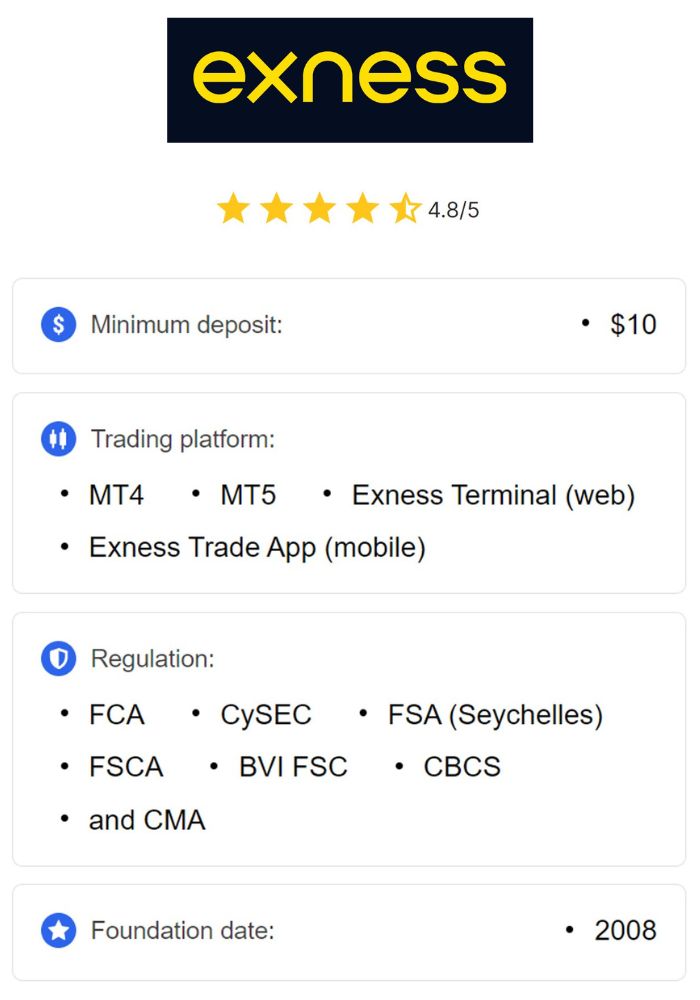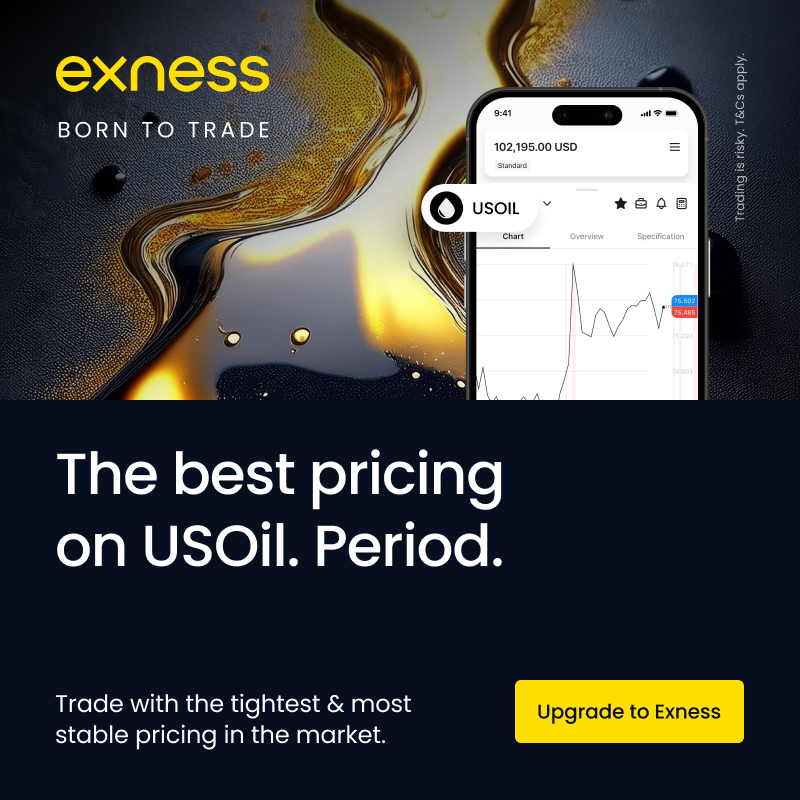
13 minute read
Is Exness illegal in India? Review Broker
Exness is a well-known forex and CFD trading platform, providing services to a wide range of traders globally. However, one of the key questions traders often ask is whether Exness is legal or illegal in India. This article explores the regulatory framework governing online trading in India, examines Exness's status, and analyzes the legalities surrounding trading with Exness in India. We will also delve into user experiences, common misconceptions, and expert opinions to provide a comprehensive view on whether Exness is a viable platform for Indian traders.

💥 Trade with Exness now: Open An Account or Visit Brokers 🏆
Understanding Exness: Company Overview
Background of Exness
Founded in 2008, Exness is a forex and CFD broker that offers a wide range of financial instruments for trading. With over a decade in the industry, the company has expanded globally, serving clients in various regions, including Europe, Asia, and the Middle East. Exness is well-regarded for its competitive spreads, flexible leverage options, and a user-friendly trading platform.
Exness’s reputation is built on its transparency and efficient execution of trades. The company operates through two main platforms: MetaTrader 4 and MetaTrader 5, which are among the most popular trading platforms in the forex industry. The platform also offers a wide array of currency pairs, indices, commodities, and cryptocurrencies for trading.
Services Offered by Exness
Exness offers various services tailored to different trading needs. These include:
Forex Trading – Exness provides access to the global forex market, offering a wide selection of currency pairs with competitive spreads and high leverage options.
CFD Trading – Exness allows trading in Contracts for Difference (CFDs) on various assets like indices, commodities, and cryptocurrencies. CFDs are a popular way to trade price movements without owning the underlying assets.
Account Types – Exness offers several account types, each catering to specific trading styles and risk levels. These include Standard accounts, Pro accounts, and Zero accounts, each with varying spreads, leverage, and commissions.
Educational Resources – Exness provides a range of educational materials to help both new and experienced traders. This includes webinars, video tutorials, and articles that cover trading strategies, risk management, and market analysis.
The Regulatory Landscape in India
Overview of Forex and CFD Trading Regulations
India’s approach to regulating forex and CFD trading is somewhat conservative. Forex trading in India is heavily regulated by government entities and financial regulators to ensure that traders are protected from fraudulent activities and excessive risk. The Reserve Bank of India (RBI) governs forex transactions in India, and trading is generally limited to currency pairs involving the Indian Rupee (INR).
CFD trading, which involves speculating on price movements of various assets without owning them, is not explicitly legalized in India. As a result, traders in India must navigate carefully to ensure they are engaging in legal trading activities.
Role of the Securities and Exchange Board of India (SEBI)
The Securities and Exchange Board of India (SEBI) is the primary regulatory authority overseeing financial markets, including securities and derivatives trading. While SEBI has a significant role in regulating Indian stock markets, its authority does not extend to regulating forex or CFD trading on foreign platforms. This is a critical point when considering whether brokers like Exness are compliant with Indian regulations.
SEBI’s role is to protect investors and ensure fair market practices. However, since Indian law restricts offshore forex and CFD trading, the oversight does not extend to brokers based outside of India.
Other Regulatory Bodies Involved
Other regulatory bodies involved in financial services in India include the RBI, which controls the foreign exchange market, and the Ministry of Finance, which oversees financial laws and regulations. These bodies collaborate to ensure that foreign currency transactions are conducted in a manner that aligns with India’s economic policies.
Legal Status of Online Trading Platforms in India
Distinction Between Legal and Illegal Trading Platforms
In India, forex and CFD trading platforms that operate outside the purview of Indian financial regulators like SEBI or the RBI are often considered illegal. The legality of a trading platform is determined by its compliance with the country’s regulations and whether it is licensed to offer trading services to Indian residents.
Legal trading platforms must comply with the Foreign Exchange Management Act (FEMA), which governs cross-border transactions, including foreign exchange trading. If a trading platform operates from outside India and offers forex or CFD trading, it may be in violation of Indian laws, unless it is regulated by an internationally recognized authority like the UK’s Financial Conduct Authority (FCA) or the Cyprus Securities and Exchange Commission (CySEC).
Compliance Requirements for Trading Platforms
For a platform to be considered legal for Indian traders, it must meet specific compliance requirements. This includes:
Registration with a recognized regulator: Platforms must be licensed and registered with an internationally recognized financial authority, ensuring that they follow strict operational guidelines.
Compliance with FEMA: Any platform that allows Indian residents to trade forex or CFDs must ensure compliance with FEMA, which regulates foreign exchange and international currency transactions in India.
Transparency and Protection of Funds: Platforms must provide transparency about their operations, including pricing, fees, and the safety of client funds. Regulatory oversight ensures that the platform adheres to these standards.
Exness and Indian Regulations
Licensing and Regulation of Exness
Exness operates under licenses from various regulatory bodies, including the FCA (Financial Conduct Authority) in the UK, CySEC (Cyprus Securities and Exchange Commission), and the Seychelles Financial Services Authority (FSA). However, Exness does not hold a license from any Indian regulatory body like SEBI.
While this may raise concerns about Exness’s legality in India, it is important to note that Exness operates legally in several countries where it holds licenses from respected financial authorities. Indian traders can still use Exness for trading, but they do so under the jurisdiction of Exness’s home country regulations, not under Indian laws.

💥 Trade with Exness now: Open An Account or Visit Brokers 🏆
Exness’s Global Presence and Regulatory Compliance
Exness’s global presence is marked by its strong regulatory compliance. The company adheres to international standards of financial conduct, ensuring its clients are protected under the laws of its operating countries. However, since Exness does not have a specific license from SEBI or the RBI, Indian traders should be aware that they are trading on an unregulated platform in the context of Indian law.
This does not necessarily mean that Exness is illegal, but it does raise questions about the legal protection for Indian traders using the platform. Traders must be cautious and aware of the risks involved in trading on an unregulated platform in India.
Risks Associated with Trading on Unregulated Platforms
Financial Risks for Traders
Trading on an unregulated platform can expose traders to various financial risks. If a platform is not governed by a regulatory authority, it may not be subject to the same financial protections or oversight. In the worst-case scenario, a trader could lose their funds if the platform goes bankrupt or engages in fraudulent activities.
Additionally, unregulated platforms may not adhere to strict standards for data security, increasing the risk of identity theft or fraud. Indian traders using Exness should assess these risks before deciding to trade.
Legal Consequences of Using Unlicensed Services
Engaging with unlicensed brokers in India can expose traders to potential legal consequences. While Indian authorities have not explicitly banned the use of foreign trading platforms, they do impose restrictions on forex and CFD trading. Traders using unregulated platforms like Exness may face issues if Indian regulators take a more aggressive stance on foreign forex trading.
Traders should be aware that, while using Exness is not explicitly illegal, the lack of local regulation may cause legal issues in the future.
User Experiences with Exness in India
Positive Feedback from Indian Traders
Many Indian traders have expressed satisfaction with the Exness trading platform. They highlight the platform’s user-friendly interface, which simplifies trading for both beginners and experienced traders. The availability of MetaTrader 4 and MetaTrader 5 is another advantage, allowing users to customize their trading experience and leverage advanced tools for analysis. Additionally, the competitive spreads and high leverage options are particularly attractive for those aiming to maximize trading opportunities with minimal capital.
Traders also appreciate the efficiency of the Exness deposit and withdrawal processes. The platform supports multiple payment methods, including local bank transfers, which makes it easier for Indian users to fund their accounts and access profits. Furthermore, Exness provides robust educational resources such as webinars, tutorials, and market analysis, which many Indian traders find valuable for improving their trading strategies.
Negative Experiences and Complaints
While many Indian traders have positive experiences with Exness, some have raised concerns about the platform’s withdrawal process. Instances of delays or additional verification requirements have been reported, which can be frustrating for users expecting seamless transactions. Such issues can be particularly challenging for traders who rely on quick access to funds to meet financial obligations or reinvest in the market.
Another common complaint relates to the lack of regulatory oversight in India. Since Exness is not regulated by the Securities and Exchange Board of India (SEBI), some traders feel uneasy about the legal risks and safety of their funds. In rare cases, users have reported difficulties in resolving disputes or receiving adequate support from customer service, which highlights the need for improved customer relations for Indian clients.
Alternatives to Exness for Indian Traders
Overview of Regulated Trading Platforms in India
For Indian traders seeking regulated platforms, several SEBI-licensed brokers are available. Platforms like Zerodha, Upstox, and 5Paisa provide a secure trading environment under the regulatory framework of SEBI and RBI. These brokers primarily focus on stock and equity derivatives, making them a suitable choice for traders who prefer a safer, locally-regulated platform.
While these brokers do not offer forex trading in international currency pairs, they are ideal for trading currency derivatives that involve the Indian Rupee (INR). They also provide access to the National Stock Exchange (NSE) and the Bombay Stock Exchange (BSE), which are well-regulated and trustworthy markets.

💥 Trade with Exness now: Open An Account or Visit Brokers 🏆
Comparison of Features and Fees
When comparing Exness to regulated Indian platforms, one major difference is the range of trading instruments. Exness offers forex and CFDs on global assets like commodities, indices, and cryptocurrencies, which are not available on most Indian platforms. However, regulated Indian brokers typically have lower fees and commissions, making them cost-effective for domestic trading.
In terms of leverage, Exness provides significantly higher options, which may appeal to traders looking to amplify their positions. However, this comes with increased risk, especially in a market as volatile as forex. Conversely, Indian brokers offer more conservative leverage ratios, aligned with SEBI’s guidelines, which may suit risk-averse traders better. The choice between Exness and local brokers ultimately depends on a trader’s goals, risk tolerance, and preferred trading instruments.
Common Misconceptions about Exness
Misunderstanding of Legality
A common misconception among Indian traders is that Exness operates illegally within India. This misunderstanding often stems from the fact that Exness is not directly regulated by the Securities and Exchange Board of India (SEBI). However, it’s important to note that Exness operates legally on a global scale and adheres to the regulatory requirements in jurisdictions where it holds licenses, such as CySEC and the FCA. For Indian traders, Exness provides its services as an offshore broker, which is not inherently illegal under Indian law.
That said, the lack of SEBI regulation means that Exness cannot directly market its services in India or provide trading facilities in INR currency derivatives. Traders need to understand this distinction to avoid conflating offshore operations with illegality. Many traders have successfully used Exness in compliance with Indian forex trading rules by trading currency pairs that include INR and adhering to local tax and reporting obligations.
Exness's Reputation in the Trading Community
Another misconception is that Exness is unreliable due to its offshore status. This perception often arises from a general distrust of non-SEBI-regulated platforms. However, Exness has established a strong reputation in the global trading community for its transparent practices, competitive trading conditions, and robust customer support. The broker’s long-standing history and positive user reviews further attest to its credibility.
Moreover, Exness provides resources and tools that are comparable to, if not better than, those offered by many SEBI-regulated brokers. Its ability to cater to both beginner and professional traders has solidified its standing as a trusted broker worldwide. By addressing these misconceptions, traders can make more informed decisions about engaging with Exness.
Expert Opinions on Trading with Exness
Insights from Financial Analysts
Financial analysts often commend Exness for its innovative approach to forex trading. The platform’s transparency regarding spreads, fees, and execution speeds sets it apart from competitors. Analysts also highlight the flexibility Exness provides through its diverse range of account types and leverage options, making it suitable for traders with varying experience levels and strategies.
However, analysts also caution traders to be mindful of the risks associated with high leverage and the importance of adhering to local regulatory guidelines. While Exness offers advanced trading tools, using them effectively requires a solid understanding of market dynamics and risk management principles. Experts recommend that Indian traders start with a demo account to familiarize themselves with the platform and gradually transition to live trading.
Perspectives from Experienced Traders
Experienced traders generally view Exness as a reliable platform for forex and CFD trading. They praise its fast execution speeds and the availability of a wide range of instruments. Many traders also appreciate Exness’s seamless deposit and withdrawal processes, which are crucial for maintaining liquidity during volatile market conditions.
However, seasoned traders emphasize the importance of understanding local trading regulations before using Exness in India. They recommend staying informed about tax obligations and legal requirements to avoid potential issues. By leveraging Exness’s features responsibly and staying compliant with Indian laws, traders can maximize their trading experience and minimize risks.
Conclusion
Exness has established itself as a reputable global forex broker, offering a wide range of features and services tailored to the needs of modern traders. While it is not regulated by SEBI and therefore operates as an offshore broker in India, this does not make it inherently illegal for Indian traders to use its platform. The key lies in understanding the regulatory framework, adhering to local laws, and making informed decisions about trading strategies.
💥 Trade with Exness now: Open An Account or Visit Brokers 🏆
For traders in India, Exness provides an accessible and user-friendly platform with competitive spreads, high leverage options, and robust customer support. However, the lack of local regulation does pose certain risks, particularly in terms of legal protections and dispute resolution. By weighing the pros and cons, traders can decide if Exness aligns with their financial goals and risk tolerance.
Ultimately, Exness’s reputation as a trusted global broker and its commitment to transparency make it a compelling choice for many traders. However, due diligence and adherence to local regulations are essential for ensuring a safe and profitable trading experience.
Read more:




